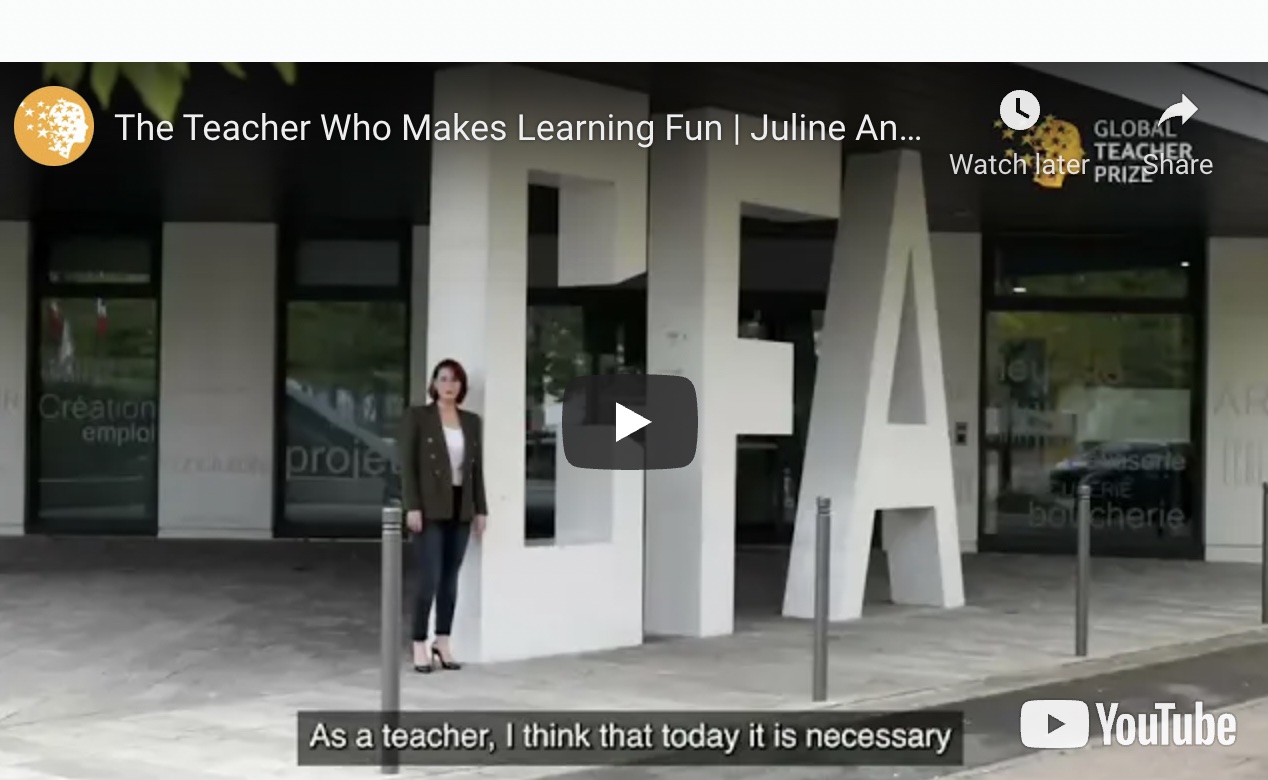. EDUCATION FOR PEACE .
An article from The Global Teacher Prize (reprinted by permission)
(Editor’s note : Juline Anquetin-Rault came to our attention by way of a article in a local newspaper in France, Tendence Ouest, where she is quoted as being inspired by the pedagogical methods of Maria Montessori. CPNN has long maintained that this pedagogy is a good model for peace education. Montessori’s methods are usually used for young children, but Juline has adapted the methods to use with adolescents. )
She is now a candidate for the Global Teacher Prize as follows:

Video from Global Teacher Prize
Even as a child, Juline Anquetin Rault knew she wanted to become a teacher, but there was a time when she doubted whether her dream would come true. When she took the national exam to become a history and geography teacher, she ranked 607th out of 6,000 candidates, but only the top 604 were hired as public school teachers. Juline was crushed, but resolved to retake the exam the following year. In the meantime, she started working as a teaching assistant in a local school. On her first day, as she helped students with their homework and went over their lessons with them, Juline knew she had found her calling, and would become a teacher no matter what. She decided to start a tutoring agency, and also began teaching in private schools that did not require educators to pass the national exam.
(Article continued in right column)
What is the best way to teach peace to children?
(Article continued from left column)
Juline now splits her time between tutoring and teaching history and geography at an apprenticeship school. There, many of her students start out disliking school, having struggled in formal education, and a large portion are foreign students still learning to speak French.
Juline believes learning should be fun, and that pupils should feel empowered to progress on their own. She has developed innovative teaching methods to engage her students, including treasure hunts and ‘pop culture’ classes using films. To help her students regain their confidence, she teaches them that failure and making mistakes are a valuable part of learning. Each class incorporates autonomous workshops, which can include internet research, online quizzes or studying maps. Juline’s methods have proven successful, with clear improvements not just in her students’ grades, but also in their mental health. In an end of year survey, 98% of students at Juline’s school said they would recommend this way of learning, and a project is in the works to apply it at national level.
Outside of teaching, since 2017 Juline has organised yearly trips for students at her apprenticeship school. In 2020, she launched an organisation to fundraise for these outings. For Juline, travelling with students is a key way to teach them to be more tolerant. Many of her pupils have never even been to Paris, which is just 90 minutes from Rouen. She has also raised funds for children in Asia and Africa to access health and education services, and encourages regular dialogue between these children and the students at her tutoring agency.
Juline is committed to helping her fellow teachers be the best they can be, and hosts training sessions to share her knowledge with colleagues. She teaches her peers how to use new technologies and memorisation techniques based on the latest cognitive science. She also frequently looks at what other teachers around the world are doing, and is inspired by passionate teachers. Juline runs a popular YouTube channel on which she shares learning and teaching materials with students and educators. If she wins the Global Teacher Prize, she would spend the funds on helping train even more teachers, to transform French education for the better.
(Thank you to Kiki Adams, the CPNN reporter for this articl